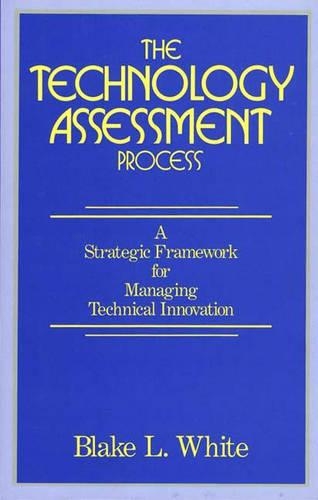
The Technology Assessment Process: A Strategic Framework for Managing Technical Innovation
(Hardback)
Publishing Details
The Technology Assessment Process: A Strategic Framework for Managing Technical Innovation
By (Author) Blake L. White
Bloomsbury Publishing PLC
Praeger Publishers Inc
7th September 1988
United States
Classifications
Tertiary Education
Non Fiction
658.57
Physical Properties
Hardback
177
Description
The book begins with an introductory chapter that sets the parameters of the technology assessment process. Subsequent chapters explore the relationship between technology and science and examine the changes wrought by technological advances. The central chapter gives general principles to assist the reader in identigying key technologies and their applicability to corporate value chain activities. White demonstrates how product development, manufacturing, and sales activities can be evaluated for possible improvement. He also shows how the goals of reducing cost, blocking competition, restructuring one's industry, and improving the idea flow among staff members can be achieved through technological innovations. At the same time, the human element is not ignored. White notes that organizational effectiveness versus efficiency, acceptance of change, political threats created by technology, holistic approaches to problem solving, and learning to learn are key organizational development issues that must accompany technological innovations. Finally, he looks at key technologies in the company of the future, including powerful microprocessors, communications networks, and artificial intelligence systems. The detailed appendix provides an introduction to computers, terminology and systems applications for readers without a technical background.
Reviews
To gain a position of leadership in an organization, the focus has to be outside in, rather than inside out. The library/information center director has to understand the role of technology and information systems in the organization as a whole and take a visionary approach that is pro-active as opposed to reactive. White's Technology Assessment Process is an excellent starting place for those who are interested in becoming leaders within their organizations. The method White describes is not unlike a strategic planning process, except in this case the planning focus is on the delivery of ALL types of information within the organization. In his introduction, he traces the growth of technology use within organizations to date. The remainder of the work concentrates on analyzing the present and looking at directions for the future. It is difficult to read this book and retain a traditional' orientation toward information storage, distribution and use. Chapter 4, Technology Assessment Considerations, ' ties the organizational information strategy to corporate objectives, and examines issues relating to organizational receptiveness. White deftly shows the interplay between organizational data on mainframes, external data from online service providers, PC's, CD-ROMs, etc. and spends considerable time on matching technology and problem structure. Chapter 6, Key Technologies and the Company of the Future, ' describes expert systems that will help us do our jobs better and assist in making judgments on the relevancy of retrieved material based on current or related projects, research interests, departmental objectives, competitive analysis, or personal interests, and prioritize routing ofinformation to the appropriate people in the organization.' The ideas in this chapter are seductive ones and I have used them with success in visioning' activities in my own organization. . . . academic and other special librarians should find it of value.-DATABASE
"To gain a position of leadership in an organization, the focus has to be outside in, rather than inside out. The library/information center director has to understand the role of technology and information systems in the organization as a whole and take a visionary approach that is pro-active as opposed to reactive. White's Technology Assessment Process is an excellent starting place for those who are interested in becoming leaders within their organizations. The method White describes is not unlike a strategic planning process, except in this case the planning focus is on the delivery of ALL types of information within the organization. In his introduction, he traces the growth of technology use within organizations to date. The remainder of the work concentrates on analyzing the present and looking at directions for the future. It is difficult to read this book and retain a traditional' orientation toward information storage, distribution and use. Chapter 4, Technology Assessment Considerations, ' ties the organizational information strategy to corporate objectives, and examines issues relating to organizational receptiveness. White deftly shows the interplay between organizational data on mainframes, external data from online service providers, PC's, CD-ROMs, etc. and spends considerable time on matching technology and problem structure. Chapter 6, Key Technologies and the Company of the Future, ' describes expert systems that will help us do our jobs better and assist in making judgments on the relevancy of retrieved material based on current or related projects, research interests, departmental objectives, competitive analysis, or personal interests, and prioritize routing ofinformation to the appropriate people in the organization.' The ideas in this chapter are seductive ones and I have used them with success in visioning' activities in my own organization. . . . academic and other special librarians should find it of value."-DATABASE
Author Bio
BLAKE L. WHITE is President and Principal Consultant of Strategic Systems, Inc., a San Francisco-based technology assessment consulting firm.
